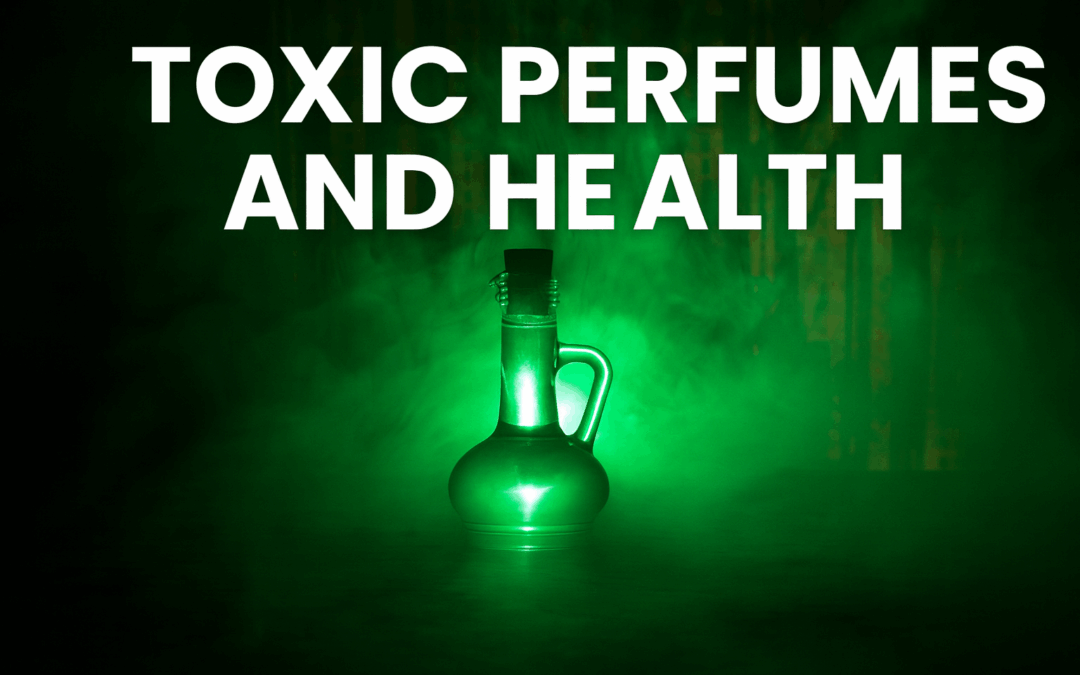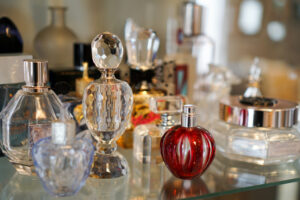The Hidden Dangers of Toxic Perfumes and Health Risks from Everyday Scents
When it comes to toxic perfumes and health, most people never realize how much exposure they have. Walk into almost any store today, and you’re surrounded by fragrance. The air smells like “fresh linen,” “spring rain,” or “mountain breeze.” Even products that don’t need scent — like tissues, detergents, or trash bags — are infused with fragrance chemicals. The question is: what are you really breathing in or rubbing onto your skin?
Many people think of perfume as a luxury — a personal signature that enhances attractiveness or confidence. But behind that enticing scent may lie a mix of industrial chemicals, many derived from petroleum, the same source used to make gasoline and plastics. These substances may contribute to a toxic burden that your body must process, potentially accelerating the very aging processes you’re trying to slow down.
The Shocking Reality: Perfume Ingredients Come from Petroleum
The perfume industry is a multibillion-dollar enterprise, and the cost of raw materials is startlingly low. While some boutique brands use natural essential oils, the vast majority of mainstream perfumes rely on synthetic aromatic compounds derived from petroleum. These chemicals can cost just a few dollars per barrel to produce — yet end up in bottles that sell for $100 or more.
To make things worse, manufacturers are not required to disclose every ingredient on the label. Fragrance formulas are legally protected as “trade secrets,” meaning that hundreds of potential chemicals can be hidden under a single word: “fragrance.”
According to the Environmental Working Group (EWG), fragrance chemicals can contain hundreds of unlisted ingredients, some of which are linked to allergies and hormone disruption. Meanwhile, NIH research has shown that many of these compounds act as endocrine disruptors and oxidative stressors within the body.
Common synthetic fragrance ingredients include:
- Phthalates – used to make scents last longer, but linked to endocrine disruption and reproductive issues.
- Musk ketones – persistent environmental pollutants that accumulate in human tissue.
- Benzene derivatives and aldehydes – associated with headaches, dizziness, and skin irritation.
- Toluene – a solvent known to cause liver and kidney damage in high doses.
When you spritz perfume onto your skin or hair, or inhale it from the air, these compounds don’t just disappear. Your body has to deal with them — just as it would if you had eaten them. That’s where the connection between toxic perfumes and health becomes clear: what you wear, you also absorb.
“If You Put It On, You’re Eating It”
The skin is your largest organ, and it’s permeable. That means that lotions, soaps, and sprays applied to your skin are absorbed into the bloodstream. Dermatologists and toxicologists alike recognize that “what goes on you goes in you.”
The same holds true for airborne exposure. Every time you inhale a fragrance, tiny chemical particles travel into your lungs, enter the bloodstream, and must be metabolized or excreted by your body. The lotion on your hands, the shampoo in your hair, the laundry detergent on your clothes — all of these can be sources of constant, low-level chemical exposure. It’s like eating tiny doses of perfume every day without realizing it.
The Toxic Load and Its Impact on Aging
Your liver, kidneys, and lungs are the primary detoxifying organs, constantly processing what enters your body. When the load of synthetic chemicals becomes too high, these systems can become overburdened. The result? Inflammation, oxidative stress, and cellular damage — all of which are closely tied to premature aging.
Chronic exposure to toxic perfumes and health-disrupting compounds can accelerate oxidative damage, disrupt hormones, and place additional strain on the body’s detox pathways.
Research in environmental medicine increasingly links chronic exposure to synthetic chemicals with issues such as:
- Hormonal imbalance
- Fatigue and brain fog
- Skin irritation and accelerated wrinkling
- Respiratory irritation or asthma
- Headaches and migraines
- Increased oxidative stress and cellular damage
In other words, slathering on scented lotions or spraying perfume may smell glamorous — but it’s not doing your cells any favors. For those focused on anti-aging and longevity, reducing your daily toxic perfumes and health burden is one of the smartest lifestyle moves you can make.
Fragrance Pollution Is Everywhere
The problem extends far beyond perfume bottles. Almost everything on supermarket shelves today is scented:
- Shampoos, conditioners, and soaps
- Body lotions and deodorants
- Air fresheners and candles
- Laundry detergents, dryer sheets, and cleaning products
- Even clothing and packaging materials
The connection between toxic perfumes and health isn’t limited to perfume bottles — it extends to everything we breathe and touch. When a product smells “fresh,” that usually means synthetic fragrance compounds were added — not that it’s clean. In enclosed environments like homes, offices, or cars, these volatile compounds (VOCs) circulate in the air and cling to fabrics, walls, and skin.
Ever noticed how one heavily perfumed person can “fill the room”? That’s because fragrance molecules are designed to linger and spread. Once airborne, they mix with other chemicals and fine particles, forming secondary pollutants — which you and everyone else then inhale.
A Real-Life Example: When “Fresh” Became Overpowering
Several years ago, my wife and I spent Thanksgiving with a close friend whose brother—a physician—owned a beautiful home in North Carolina with a separate guest house. The moment we stepped inside, we were hit with an overwhelming wave of artificial “freshness.” It was so strong that we could hardly breathe. Within minutes, both of us developed headaches, and I joked to my wife that someone must be trying to hide a corpse because the air smelled that unnatural.
Determined to find the source, I started looking around and discovered one plug-in air freshener after another. I pulled out the first, but the smell didn’t fade. Then another. And another. If memory serves, there were at least eight—possibly ten—scattered throughout the house. Even opening the windows in November barely helped. It was a perfect illustration of how “fragrance” can transform from a pleasant accent into an assault on the senses.
Experiences like that bring home the reality of toxic perfumes and health concerns. What we often think of as clean or inviting can actually fill the air with synthetic chemicals that irritate the lungs, trigger headaches, and overload the body’s detox systems. That evening left a lasting impression on both of us—and a firm commitment to keep our own home fragrance-free.
The Aisle-Five Effect
Here’s a vivid way to picture it: imagine a supermarket with perfume or detergent on aisle five and fresh bread on aisle six. The air in that store is shared. Those perfume vapors don’t politely stay in their lane — they drift, and the bread (a porous food) absorbs airborne particles. So even the “unscented” areas aren’t truly fragrance-free.
Now multiply that by every scented household item you own — from “ocean breeze” trash bags to “lavender fresh” dryer sheets — and you start to see how pervasive the issue is. You’re not just smelling it; you’re living in it.
The Problem with “Fragrance-Free” and “Natural” Labels
You might think you’re safe if you buy “fragrance-free” or “unscented” products, but marketing can be deceiving. Some “fragrance-free” products still use masking fragrances to neutralize other smells. Likewise, “natural” doesn’t always mean non-toxic — a product may still contain synthetic fragrance components alongside natural oils.
To identify truly safe options:
- Look for “no synthetic fragrance” on the label.
- Choose products scented only with pure essential oils (and even then, check purity).
- Use unscented detergents and non-toxic cleaning products certified by third-party programs like EWG Verified or Made Safe.
- Avoid plug-in air fresheners and aerosol sprays. Instead, use natural alternatives like open windows, houseplants, or essential oil diffusers.
The Better Smell of Clean Living
Eliminating artificial fragrances doesn’t mean living in a scentless world. Natural alternatives like essential oils — when used safely and sparingly — can add pleasant aromas without the chemical burden. Scents like lavender, citrus, eucalyptus, or peppermint can even have health benefits when diffused or used topically with proper dilution.
Reducing your exposure to toxic perfumes and health stressors gives your body room to regenerate and perform its natural detox processes. However, moderation is key. Even natural substances can cause irritation or allergies in sensitive individuals. The goal is to let your home, skin, and body breathe freely — not to replace one form of chemical overload with another.
A Step Toward Anti-Aging and Total Health
If your goal is longevity, cellular vitality, or slowing the visible signs of aging, reducing your exposure to environmental toxins is crucial. That includes what you breathe, apply, and live among every day.
Just as you might choose clean, nutrient-rich foods to nourish your body, you can choose clean, non-toxic personal care and home products to protect it. Every small choice adds up to less internal stress — and that means fewer free radicals, less inflammation, and a body that ages more gracefully.
For a deeper look at reducing toxin exposure and supporting detox pathways, visit ToothWiz Vitamins for curated wellness products that complement your clean-living lifestyle.
The Bottom Line
The next time you reach for that bottle of “floral fantasy” perfume, remember: it’s not just perfume. It’s a chemical cocktail that your skin absorbs, your lungs inhale, and your liver has to process. The link between toxic perfumes and health outcomes is undeniable. If you wouldn’t eat it, maybe you shouldn’t wear it.
Frequently Asked Questions
Can wearing perfume really affect my oral or respiratory health?
Yes. While perfume is applied to the skin, the vapors are inhaled continuously. Synthetic fragrance molecules can irritate mucous membranes, including those in the mouth, sinuses, and lungs—especially in enclosed spaces. Over time, that exposure can contribute to inflammation or sensitivity in airways.
What are safer alternatives to synthetic perfumes?
Choose natural, essential-oil–based fragrances labeled “no synthetic fragrance.” Even better, opt for minimal or fragrance-free products in detergents, body lotions, and hair care. They reduce cumulative exposure and support overall oral and systemic wellness.





